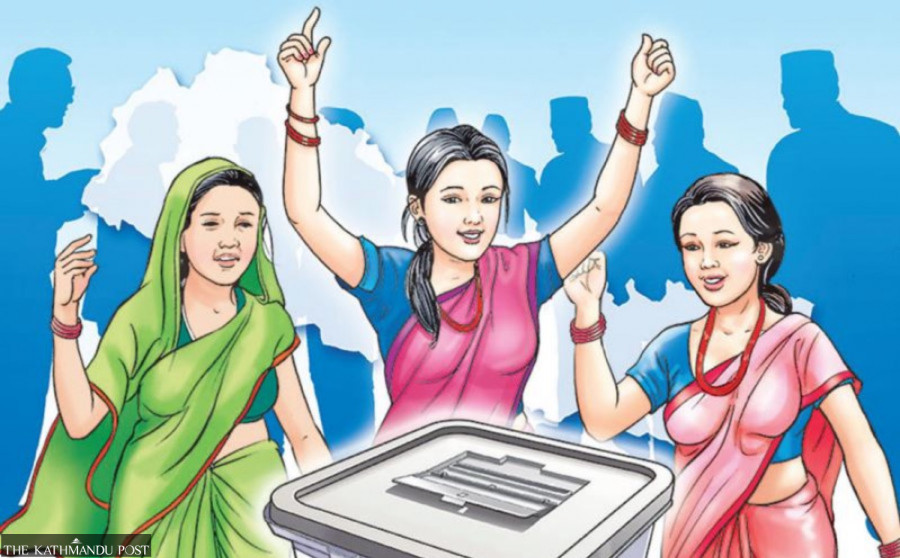Editorial
Hope amid despair
The proposed bill to field more directly elected women candidates is a silver lining.
Despite having some lacunae on women’s citizenship rights, the Constitution of Nepal 2015 got one thing right: A third of elected representatives in the federal Parliament must be women, it stipulated. But the political parties tried to honour the constitutional provision by inducting women representatives through proportional representation while nearly banishing them from direct election.
The result is for all to see: Only six women lawmakers were elected directly in the 2017 federal elections, while nine were elected in the 2022 elections. Many of the actors responsible for guaranteeing one-third women’s representation in Parliament now seem happy to limit their political role. This betrays their latent misogyny. Men thus continue to fiercely guard the first-past-the-post (FPTP) electoral system. This could all change though.
The Election Commission of Nepal is finalising a bill that will guarantee one-third women’s FPTP candidates in elections for all three tiers of government. The commission’s plan is a silver lining in otherwise dark times for women, their rights and representation. For one, the bill, if enacted by the Parliament, will force parties to involve more women in their day-to-day functioning instead of scrambling to find women candidates for proportional representation at the last moment—and just to meet the constitutional mandate.
As of now, most women in political parties have been limited to secondary roles and nearly universally barred from top positions. This is again a result of men’s structural dominance in direct elections. Even when women have been given direct election tickets, for instance in local elections, over 90 percent of them had to run for deputy posts rather than for chairpersons. The Election Commission is reportedly working to extend the provision of a third of mandatory direct tickets going to women to the local level.
If so, it will not only lead to a greater and more active participation of women in politics. Gender equality in all aspects of national life is a core principle of Nepal’s constitution, and it should be ensured in order to ensure, as sociologist Anthony Giddens would put it, “a democratisation of democracy”. Democracy can only be democratised, Giddens says, if there is effective devolution of power. A devolution of power is unthinkable in the absence of women actively partaking in it.
The status of women in the public sphere is undoubtedly better today than what it was just a couple of decades ago, but the same has not been reflected in the political sphere. There is, therefore, a lot of work to be done to ensure greater visibility of women in top decision-making positions. There is also a need to foster a culture of gender affirmation, where women’s leadership is considered not an aberration but the norm.
Women are increasingly becoming economically independent, a prerequisite for their greater participation in politics. Society’s perception of politics as a prerogative of men is changing, and the men at the top of parties’ hierarchy should internalise this. The old power dynamics will no longer work. Rather than just pay lip service to women’s rights, the parties can now finally do something concrete to secure them.
There will no doubt be a level of resistance to the new bill that aims to cut men’s supposedly god-given right to contest all directly contested electoral seats. But then those who stand against it in Parliament will badly expose themselves as supporters of male hegemony, and so they will have the incentive to go along and give the bill a thumbs-up. And so it should pass. In the end, the leadership at the Election Commission must be applauded for taking this bold initiative.




 13.12°C Kathmandu
13.12°C Kathmandu














